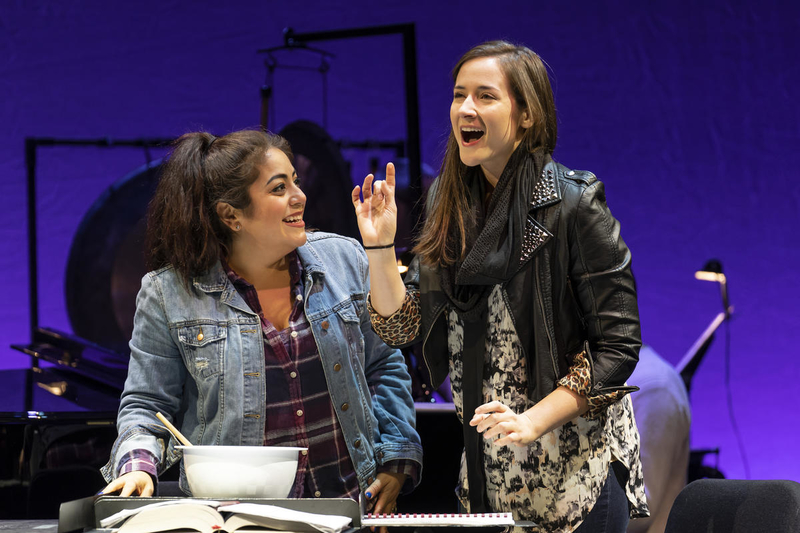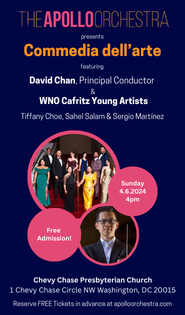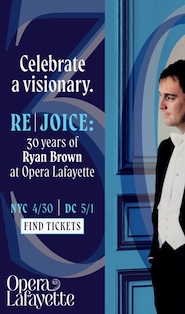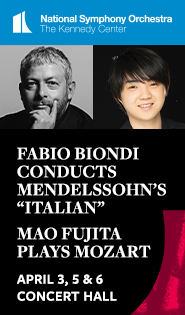WNO’s American Opera Initiative serves up an intriguing trio of new works

The American Opera Initiative, Washington National Opera’s program devoted to developing new work, presented its annual set of 20-minute commissions Friday night at the Kennedy Center Terrace Theatre. While the results are frequently mixed, these evenings always offer a welcome opportunity to understand how composers of the moment are addressing familiar challenges.
The opening entry, Woman of Letters, with music by Liliya Ugay and a libretto by Sokhunthary Svay, follows Sonya, the daughter of first-generation immigrant Sam, as she attempts to convince her hardworking father to allow her to attend college abroad, over his objections to her leaving home. With a modest “kitchen-sink” scenario like this, there is an extra imperative for the creators to find new and engaging ways to convey the material and grab our attention.
Unfortunately, Woman of Letters, while never short on sentiment, trades too much in calculated moments that too neatly telegraph the emotions in play rather than building musical drama to demonstrate where they come from. While allowing a character to step outside the scene and directly state their perspective is more permissible in an opera libretto than elsewhere, lack of attention to building tension and context simply merely leaves us with dramatic bullet points.
See, for instance, Sam’s opening statement about his anguish that the kids at the school where he serves as a janitor don’t “really see him.” While a useful point about the character that helps to set up the vulnerability that will later cause him to refuse his daughter, it is clumsily inserted into a scene in which he is supposed to be greeting his daughter after a routine day of work.
Ugay’s music tries to underline the story and the emotional import of what we are watching. Copland-esque strains in the violins lingering over a melancholy piano attempt to break our hearts from the very first bars. Each character gets a strong musical identity, the challenging, ascending lines for the daughter representing her yearning for the future, in contrast to the halting bass figures describing the father’s past trials. But ultimately, the effusive score only serves to reinforce that Woman of Letters is signifying the emotions we should feel rather than getting us to feel them.
The final misstep here was the introduction of a cloying “coloratura” part for the daughter’s childhood friend, who is studying to be an opera singer, as a comedic tonal change during the work’s middle section. While impressive writing for what it was, this seemed a bit opportunistic and added little either musically or dramatically to the overall work.
The next work, Admissions, is a ripped-from-the-headlines send-up of the current college admissions scandal, with an anonymous family standing in for various boldface names. The scene finds the parents returning home from a court hearing on bribery charges to reckon with the sheltered offspring who have been their unwitting beneficiaries. Though full-length new comedic operas are in short supply relative to dramas, they are frequently a highlight of the American Opera Initiative evenings, and Admissions makes a strong case for the genre.
Perhaps most importantly, Kim Davies’ libretto is legitimately funny. The easy joke in such pieces is hearing mundane references sung by operatic voices (“Instagram influencer!”), and while this work is not immune to this tired crutch, for the most part this is just entertaining, clever writing. Admissions also benefits from a tight structure and brisk pacing that never allows a single joke or scenario to overstay its welcome. It is always enjoyable to see where these short works could serve as the seed for something longer, and one could easily see this as the raucous opening to a longer work that finds these characters seeking redemption (or not) in the fallout from the scandal.
Michael Lanci’s score skillfully complements the scene, with a range of colorful effects highlighting the underlying strains of acrimony between the characters while maintaining a thread of sarcastic commentary. Comedy often involves more nuanced emotions than drama, and Lanci’s score seemed to grow deeper and more ambiguous as the scene progressed, the anxious repeated strings that set the scene giving way to bitter dark figures in the horns’ lower registers as new revelations increase the characters’ despair. The lovely scoring for the Mother’s final coda, in which she protests that she was only trying to do the best for her children made for a final disarming surprise.
The last offering, composer Carlos Simon’s Night Trip, presented perhaps the most musically ambitious of the three works. The story follows two black World War II veterans driving their young relative Conchetta from Chicago to Tennessee, and a dangerous encounter with a racist gas station attendant and police officer. Simon’s score opens with a frenetic collage of influences from the period, mixing snippets of Jazz, Motown, and martial motifs for the veterans. These are not reserved solely for the orchestra, however—the substantial opening aria for Conchetta tasks the singer (the tremendous Rehanna Thelwell) with handling these stylistic shifts vocally as well.
Incorporating these musical genre “quotes” can risk crowding out a distinctive voice for the score in favor of a sound that appeals more as a skillful reproduction than something organic to the work. But Simon manages to avoid these pitfalls, deploying these pastiche fragments in short bursts to create a soundscape that embroiders the fundamental dramatic thrust of the music rather than replacing it. The final scene for Conchetta which bookended the work, an intimate reflection on the violence she has been subject to, further reinforced Simon’s ability to create compelling solo musical statements on a substantial scale.
What further distinguishes Night Trip is Sandra Seaton’s libretto, which, especially in the arias for Conchetta, attains a level of poetry that allows for authentic and thrilling fusion between text and score. Though the dialogue for the core “action” scenes are a bit pat and might benefit from less literalism, Seaton clearly excels at the tricky task of both allowing the character to speak while leaving enough room for the music to organically fill out the emotional message of the work.
Several of the principal women stood out among the casts of the three works, which was entirely drawn from current members of Washington National Opera’s Young Artist Program. Soprano Marlen Nahhas brought a fresh, exuberant energy to the challenging music of the daughter in Woman of Letters, while Amanda Lynn Bottoms’ rich, expressive soprano helped anchor the Mother character at the center of Admissions, commanding the stage with defiant bitterness, but also bringing real pathos to her later sympathetic plea. The most impressive turn of the evening was reserved for Rehanna Thelwell in Night Trip, who brought a thrilling commitment and dramatic intelligence to the bravura solo scenes that bookended the piece.
Supporting work was strong as well, with notable contributions from Alexandra Nowakowski in the coloratura passages in Woman of Letters (however misguided the concept), Joshua Blue’s twitchy veteran in Night Trip, and the collective comedic chops of Bottoms, Nahhas, bass William Meinert, and tenor Matthew Pearce, in Admissions. Conductor Anne Manson led the small chamber orchestra in sensitive and detailed readings of the new scores.






Posted Jan 12, 2020 at 11:30 pm by Composer
“The final misstep here was the introduction of a cloying “coloratura” part for the daughter’s childhood friend, who is studying to be an opera singer, as a comedic tonal change during the work’s middle section. While impressive writing for what it was, this seemed a bit opportunistic and added little either musically or dramatically to the overall work.”
You have to remember that this was not a fully staged performance. A scene with Dara is that part of dramatic action that you stated you missed: the cause of Sam changing his mind, and Sonya writing him a letter, using her words – her poetic talent to convince him. It was perhaps not clear in the last scene that Sonya writes the letter to Sam, which he (as if in the different time, but we see them both simultaneously) reads, because the limited set up and because the singers had to use the music, which limited the action.
Nevertheless, other reviewers thought differently about that scene.
Some pieces need more time to work on in order to be realized at their best. Some have more familiar musical language/approach than others, which affects not just audience, but everyone including the musicians.
However, thank you for your time in writing this review.
Best,
L.